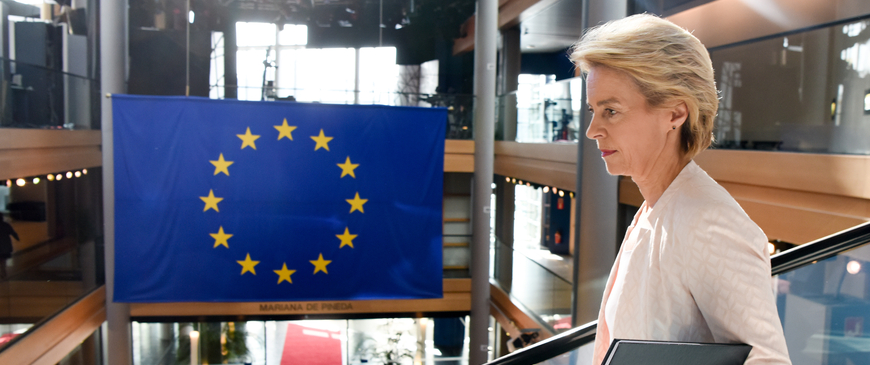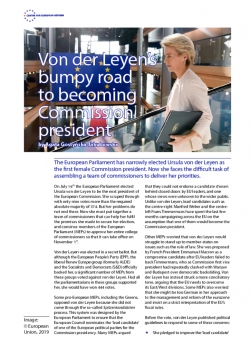
Von der Leyen's bumpy road to becoming Commission president
The European Parliament has narrowly elected Ursula von der Leyen as the first female Commission president. Now she faces the difficult task of assembling a team of commissioners to deliver her priorities.
On July 16th the European Parliament elected Ursula von der Leyen to be the next president of the European Commission. She scraped through with only nine votes more than the required absolute majority of 374. But her problems do not end there. Now she must put together a team of commissioners that can help her fulfil the promises she made to secure her election, and convince members of the European Parliament (MEPs) to approve her entire college of commissioners so that it can take office on November 1st.
Von der Leyen was elected in a secret ballot. But although the European People’s Party (EPP), the liberal Renew Europe group (formerly ALDE) and the Socialists and Democrats (S&D) officially backed her, a significant number of MEPs from these groups voted against von der Leyen. Had all the parliamentarians in these groups supported her, she would have won 444 votes.
Commission president-elect Ursula von der Leyen cannot afford yet another tight vote in the European Parliament on her college of commissioners.
Some pro-European MEPs, including the Greens, opposed von der Leyen because she did not come through the so-called Spitzenkandidaten process. This system was designed by the European Parliament to ensure that the European Council nominates the ‘lead candidate’ of one of the European political parties for the Commission presidency. Many MEPs argued that they could not endorse a candidate chosen behind closed doors by EU leaders, and one whose views were unknown to the wider public. Unlike von der Leyen, lead candidates such as the centre-right Manfred Weber and the centre-left Frans Timmermans have spent the last few months campaigning across the EU on the assumption that one of them would become the Commission president.
Other MEPs worried that von der Leyen would struggle to stand up to member-states on issues such as the rule of law. She was proposed by French President Emmanuel Macron as a compromise candidate after EU leaders failed to back Timmermans, who as Commission first vice president had repeatedly clashed with Warsaw and Budapest over democratic backsliding. Von der Leyen has instead struck a more conciliatory tone, arguing that the EU needs to overcome its East/West divisions. Some MEPs also worried that she might be too German in her approach to the management and reform of the eurozone and insist on a strict interpretation of the EU’s fiscal rules.
Before the vote, von der Leyen published political guidelines to respond to some of these concerns:
- She pledged to improve the ‘lead candidate’ system and set up a conference on the future of Europe to come up with proposals to that effect.
- She attempted to ease concerns that she would stick rigidly to the traditional German approach to the eurozone debate by promising to make full use of the flexibility allowed within the EU’s fiscal rules. She also proposed an unemployment reinsurance scheme to help countries that have suffered a severe economic shock.
- She pledged to improve the EU’s toolbox for addressing rule of law violations. In her view, no member-state is perfect, and the Union should regularly assess how EU values are being upheld in all member-states.
In order to put these ideas into action, the president-elect will need an effective team of commissioners. While the member-states nominate their candidates for commissioner, it is the president who decides which roles they get. Not everybody can have a strategically important portfolio, so von der Leyen will need to stand up to member-states that try to put pressure on her as she matches the nominees to jobs.
In her pitch to the European Parliament, von der Leyen promised that her college would be gender-balanced, and that she would ask member-states to offer a female and male candidate. However, several countries have ignored that and only put forward a male nominee. She should ask these countries to suggest a female candidate as well. Being firm with these recalcitrant member-states would help her win over MEPs who fear that she is under the thumb of EU capitals.
Von der Leyen should also allocate some senior posts to representatives from Central and Eastern Europe and Scandinavia, which would help her secure the support of MEPs from these countries. So far, the top EU jobs have all gone to Western European candidates: the European Council elected a Belgian to be European Council president; and nominated a Frenchwoman to head the European Central Bank, a German to head the European Commission and a Spaniard as the EU’s high representative for foreign and security policy.
The new president-elect should also follow Jean-Claude Juncker’s example, and organise the work of her college around ‘project teams’ to deliver her six priorities: 1) a European Green Deal; 2) an economy that works for people; 3) a Europe fit for the digital age; 4) protecting the European way of life; 5) a stronger Europe in the world; and 6) a new push for European democracy.
She should put vice presidents in charge of team projects and ask them to filter out any initiatives that do not correspond to her priorities. There were 40 per cent fewer EU legislative acts during the Juncker Commission than in the previous five-year period when José Manuel Barroso was president. Von der Leyen should put one of her senior commissioners in charge of better regulation, to make sure that her Commission is acting only where it is necessary and where it clearly brings added value. This approach would help counter the eurosceptic narrative that the EU produces too much red tape.
There are also some issues in von der Leyen’s political guidelines, such as cyber security, that touch upon more than one of her priorities. They would best be tackled by flexible ‘task forces’ that combine experts from various Directorates-General and the Secretariat General. This kind of flexible setup, managed by a commissioner, would enable the Commission to respond quickly, and comprehensively, to new emerging challenges.
Even with a stellar team of commissioners von der Leyen will struggle to deliver some of the promises she made to the European Parliament.
But even with a stellar team, von der Leyen might still find it difficult to deliver on some of her promises. Progress on eurozone integration will depend on the support of EU leaders rather than the determination of the Commission. Eurozone finance ministers have shown little appetite to take bold steps: they have reluctantly agreed to pave the way for a ‘budgetary instrument for convergence and competitiveness’. But rather than stabilising the eurozone, as was initially envisaged by Macron, the instrument will only support structural reforms and public investment, and it will be too small to make any macroeconomic difference.
Von der Leyen narrowly succeeded in winning approval of the European Parliament. The limits of her power, however, lie in EU leaders’ unwillingness to take ambitious steps towards resolving the EU’s most pressing problems. But if they are serious about listening to voters’ concerns about climate change, jobs and security, member-states should support von der Leyen’s efforts to build a stronger Europe.
Agata Gostyńska-Jakubowska is a senior research fellow at the Centre for European Reform.

